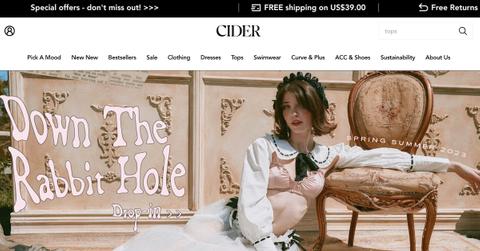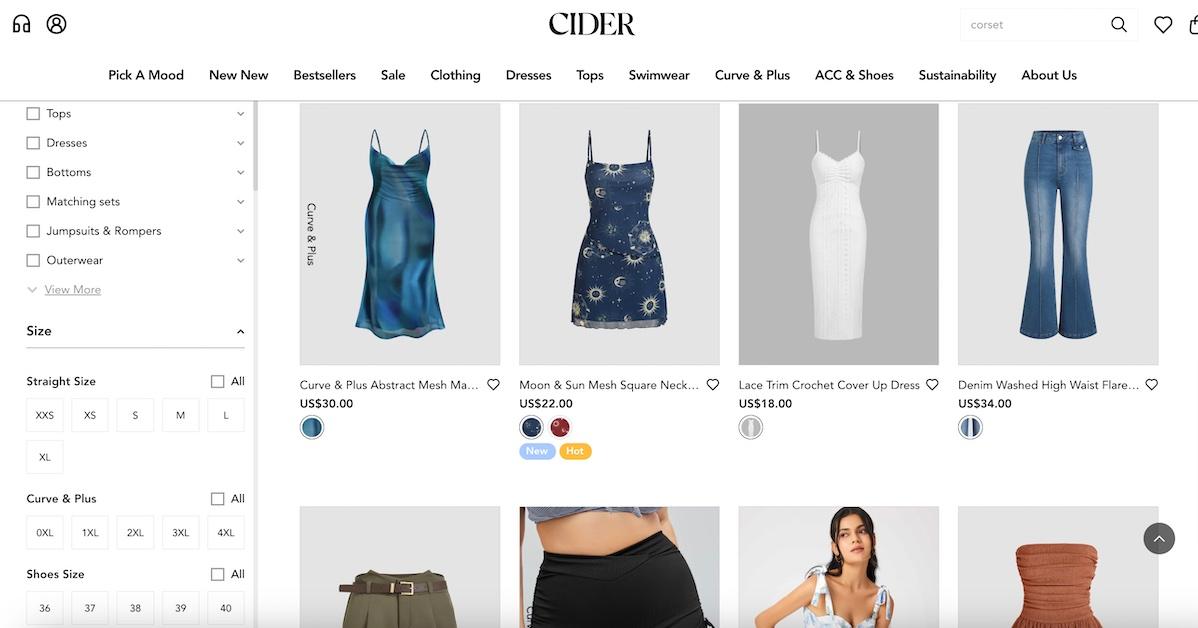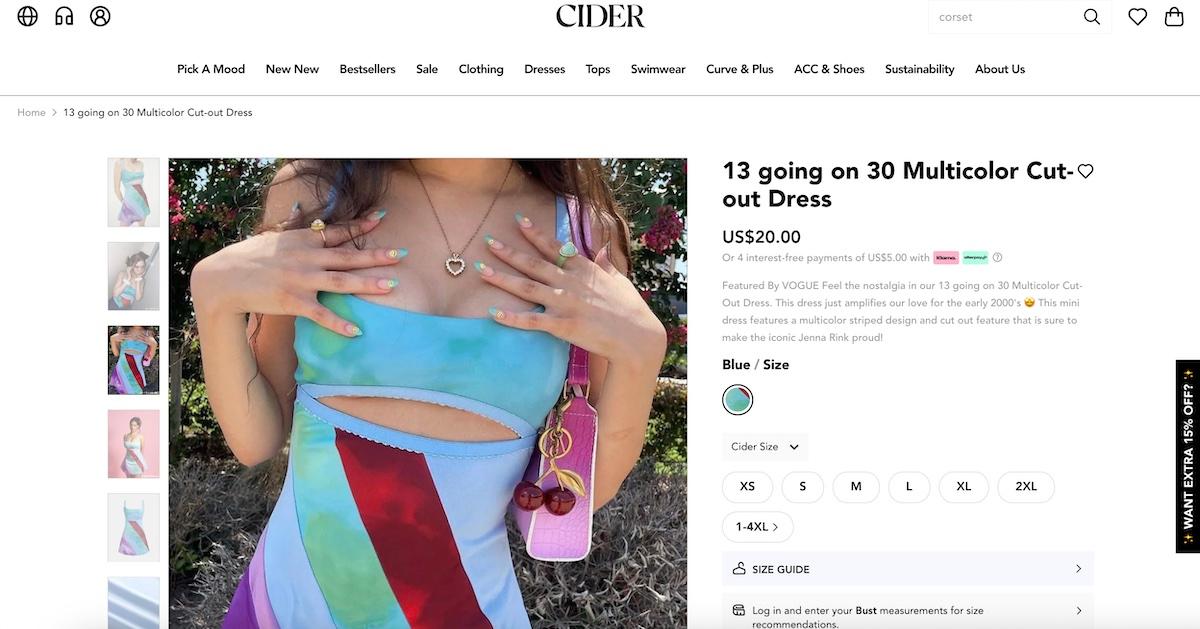Cider May Sell Viral Outfits, But It's Nothing More Than a Fast Fashion Brand
Published May 10 2023, 1:05 p.m. ET

"Sustainable fashion should be accessible, not exclusive."
Believe it or not, that is a quote from the the sustainability page on Cider's website — something that might prompt customers to think that Cider, aka Shop Cider, is a brand that actually cares about sustainability in the fashion industry. However, that is not actually the case, as Cider is just another example of contemporary direct-to-consumer clothing brands proving how successful the fast fashion business model can be.
So is Cider technically a fast fashion brand? Just how ethical is Cider? And for that matter, how ethical is it to shop from Cider? Keep reading to learn more about where Cider stands on the fast fashion industry spectrum.

Is Cider fast fashion?
Yes, Cider is a fast fashion company. In fact, Good On You, a website that rates fashion brands based on how sustainable and ethical they are, describes Cider as an "ultra fast fashion brand."
Good on You also gave Cider its lowest score of “We Avoid,” noting that the company has a concerning "lack of action across the board" in terms of fairness, environmental impact, and more.
Interestingly, Cider is one of the newest fast fashion brands out there, so it's significantly smaller than some of the major fast fashion players on the market.
What you need to know about Cider:
Four friends founded Cider in 2020, and two of them remain at the helm of the brand, as of publication: Fenco Lin, Cofounder and Chief Fashion Officer; and Yu Oppel, Cofounder and CMO.
Cider, found at www.shopcider.com, is a direct-to-consumer, online-only company. It describes itself as "a global fashion brand" inspired by the street styles of major cities all around the world. According to Daxue Consulting, Cider's business model is similar to that of Shein (one of the biggest DTC fast fashion brands in the world), as it is guided largely by frequently rolling out new trendy items, charging shockingly low prices, and social media promotion.
Cider's annual revenue is estimated to be between $1 million and $2 million. For comparison, Shein's revenue in 2022 was $22.7 billion, and Forever 21's annual revenue is about $4 billion.
Various Cider clothing items have gone viral, including a sweater with an orange fruit pattern, a sweater dress with a matching shrug, and a $20 dress that knocks off a dress Jennifer Garner wore in 13 Going on 30.
Overall, Cider's prices are low — for example, tanks start at $6, and dresses start at around $10. The prices may not be as low as those seen on Shein or PrettyLittleThing (which once sold a dress for 8 pence), but they're still very low in the scheme of the fashion industry.
So how exactly does Cider charge such cheap prices?

Cider's low prices can likely be attributed to cheap labor.
Cider claims that it has a "responsible supply chain," that it conducts "regular factory audits and monthly tours on our end," that its factories are registered with various business standards, and that Cider partners "with a number of ethical factories."
"By sourcing ethically, we are able to provide our customers with products that have been made in a safe and fair environment," Cider's website states.
However, all of these claims are only supported by a few sentences about just three of Cider's overseas suppliers — and this info just isn't nearly transparent nor sufficient enough.
All of Cider's factories appear to be located in China, where (and yes, this is a generalization) it's common to find factory workers who are criminally underpaid and overworked.
And considering Cider's frequent production of clothing and low prices, it would be essentially impossible for the brand to produce its clothes by any means other than outsourced cheap labor.
Cider also cuts costs by largely ignoring its environmental impact.
Cider claims that it creates its clothing "with sustainability in mind," pointing to its "smart fashion model that only produces on demand" as well as its use of recycled materials.
However, there is a major lack of transparency to back up these claims.
While Cider does have a Recycled Fabric Collection, which uses "recycled materials certified by Global Recycled Standard," this line represents a small fraction of Cider's offerings, with only a few hundred items. Not to mention, for many of the items in this collection, the recycled materials (typically, polyester) do not even represent 100 percent of the item's composition.
Overall, most of the fabrics used are synthetic (plastic-based), such as polyester, polyamide, elastane, and spandex, as well as conventional cotton.
Cider also boasts its "smart fashion" model, which involves adjusting production on the spot in response to customer data, which helps the brand produce less waste. Additionally, Cider states that its suppliers use "membrane technology" which is a more efficient way of treating wastewater.
Cider also packages each item sold in bags made from bioplastic, which can be composted (presumably, only in industrial compost settings).
While these efforts can be framed as better than nothing, they also fall into the camp of greenwashing, which is when a brand uses unverified claims and buzzwords to evoke sustainability as a marketing tactic.
These efforts are simply not enough. The fast fashion business model makes it impossible for any fast fashion brand to be truly sustainable.
Cider has been the subject of various controversies.
As reported by The Tab, Cider has had a few ongoing scandals. For one thing, Cider has openly copied designs from other brands — again, see the 13 Going on 30 dress, which was originally designed by Versace.
Many have also accused Cider of appropriating Chinese culture in various designs. Others have condemned Cider for its lack of inclusive sizing, though as of publication, Cider now has a "Curve & Plus" collection with sizes up to 4XL.
Unfortunately, Cider's efforts just aren't enough.
Overall, everything that makes Cider what it is, also makes Cider a fast fashion brand. We'd love to see Cider make some big changes — but in the meantime, there are so many more ethical and sustainable alternatives to shopping fast fashion, our favorite recommendation being that you shop secondhand. You can even search on secondhand websites like Poshmark, Depop, and thredUP for specific items — including Cider's 13 Going on 30 dress.